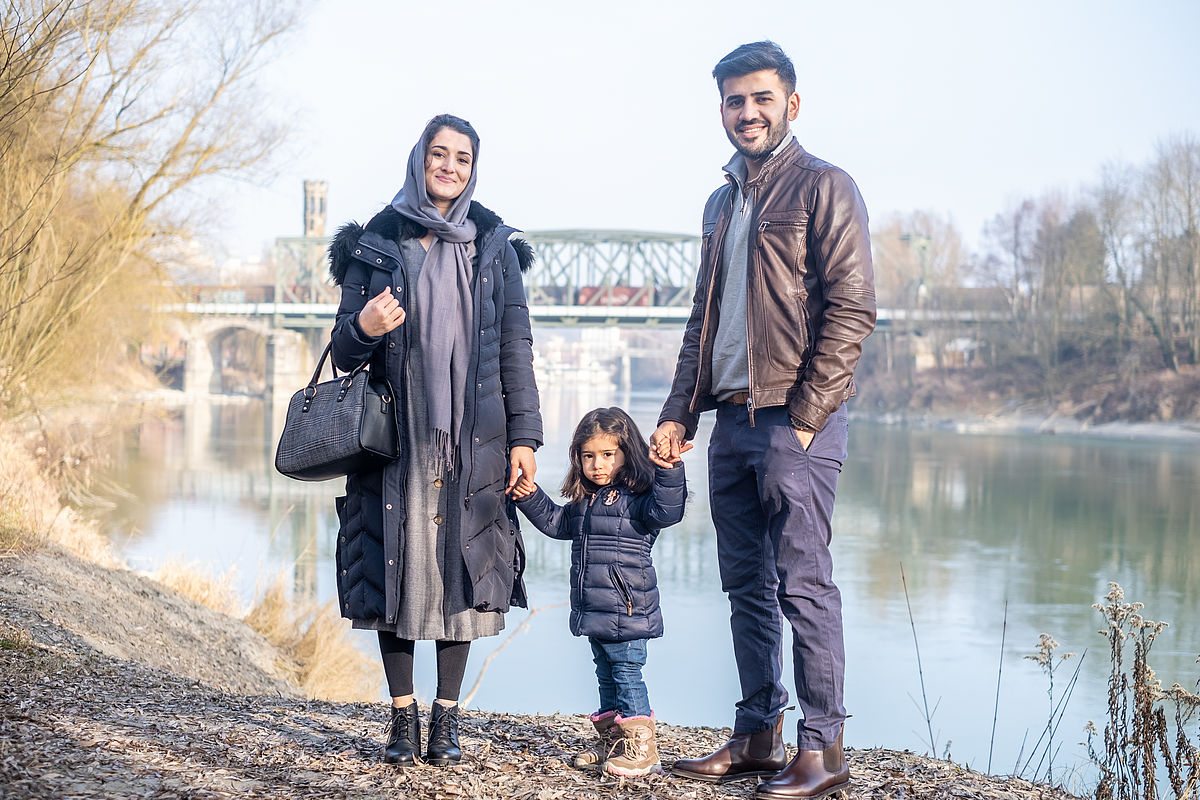“I want to be a role model for Afghan girls”
Max Planck Fellow and legal scholar Suhailah Akbari is one of very few Afghan women who pursue a professorship career. During her stay at the University of Passau, she became a mother and successfully managed to balance family and research.
In December 2015, Silla Akbari moved with her husband Parwiz Akbari from Takhar, Afghanistan, to Passau when she was offered a fellowship from the Max Planck Foundation for International Peace and the Rule of Law to do her doctorate in law. In the past four years, Silla worked alongside Professor Christoph Herrmann and his team at the Chair of Constitutional and Administrative, European Law, European and International Economic Law, while her husband worked as an internist at the hospital in Vilshofen. During her stay, Silla became a mother and successfully managed to balance research and family. She says that she is particularly thankful for the support they received upon their arrival from the Welcome Centre and both from the University’s Women’s Office and Professor Herrmann’s chair after the birth of their daughter Haya. She is now going to return to Afghanistan to continue her professorship career and advocate for girls’ higher education.
Why did you come to the University of Passau?
After finishing my master’s degree at the University of Washington, I received the offer to come Passau as a research fellow of the Max Planck Foundation for International Peace and the Rule of Law. Since the beginning of my studies at Takhar University, I have always been extremely interested in International Trade Law, especially for the reason that there is a lack of Afghan expertise in this field. When I got the offer from the Max Planck Foundation, which allowed me to contribute to academia and my homeland, I was very happy to accept it and come to Passau.
What is the focus of your doctoral thesis?
My thesis examines the regime of the World Trade Organization (WTO) of freedom of transit for landlocked country members, particularly landlocked LDCs, to discuss whether and to what extent the special transit needs of landlocked countries are recognized. The findings of my research are particularly important for my home country Afghanistan, because political and security instabilities between Afghanistan and its coastal neighboring states often challenge Afghanistan’s transit trade with those countries, in particular Pakistan.
You are now going to return to Afghanistan. What are your plans?
In Afghanistan, I will return to my teaching position at Takhar University and I hope I can continue my research on International Trade Law and Regional Trade Law and focus on Afghanistan’s integration into the world trading system. I have always perceived my profession as a lawyer and lecturer as an opportunity to speak up for gender equality. Since I am the only female lecturer at the Takhar University, Faculty of Law and Political Science, I want to be a role model for Afghan girls who want to pursue a professorship career. It’s my goal to improve higher education for them and to advocate female participation in decision-making at Takhar University.
What barriers do women in Afghanistan face when it comes to higher education?
The public discourse is influenced by conservative Islamic gender conceptions. Consequently, especially in rural areas, women still face social barriers to participate in the public discourse and, for example, they are discouraged from studying outside their province. When I started teaching at Takhar University, in a class of 60 students, there were at best four female students. Since then, this has certainly improved, but the percentage of female students and especially female researchers remains low.
How did you perceive the opportunities at the University of Passau?
Especially the support I received after giving birth to my daughter Haya was truly amazing. In my opinion, the University of Passau is an academic role model with regard to its offers for young parents. Trying to manage motherhood and research, the support from the women’s office was a huge relief to me as they helped me with structural and financial issues. They create a compatible environment for young parents with their services such as babysitting and a place in the nursery school “Unikinderkrippe Krümelkiste”. Also, they provide the necessary amenities for parents and children, for example dedicated rooms for diaper change or breastfeeding. I hope that in the future we can establish a women’s office similar to the one in Passau at Takhar University. Besides the remarkable support from the women’s office, I am equally grateful for the support I received from my supervisor, Professor Herrmann, and the entire team at his chair. Ultimately, I owe my accomplishments to both the women’s office and the chair as their incomparable support facilitated the completion of my Ph.D. Research.
How did you and your family experience Passau in general?
With the support of the University’s Welcome Centre, we had a stress-free arrival. Thanks to Jana and her team, the only thing we had to do upon our arrival was to sign our rental agreement and we were good to go. They even organized trips around Bavaria for all the international researchers. Bavaria has become my second home and Passau will always have a special place in my heart – especially because my daughter was born here! We enjoyed our time in Passau very much. The size of Passau also makes it a very family-friendly town with many outdoor play areas in reach. Everything is in walking distance so we could really enjoy Passau’s stunning greenery.
What are you going to miss the most about Passau?
The beautiful view of the Inn and the surrounding nature from our apartment. I am also going miss my colleagues, who have supported me immensely during my time here.
Soon, Silla Akbari will be able to use textbooks from Passau in her lectures at her home university: The University Library and Professor Herrmann's chair are donating various textbooks on international law.
Interview: Rebecca Neumayr





